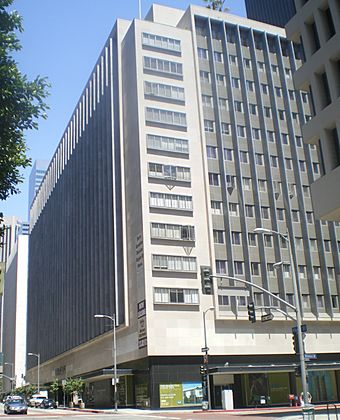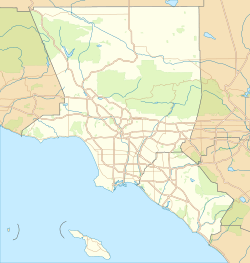General Petroleum Building facts for kids
Quick facts for kids |
|
|
General Petroleum Building
|
|

General Petroleum Building, 2008
|
|
| Location | 612 S. Flower St., Los Angeles, California |
|---|---|
| Built | 1947-1949 |
| Architect | Wurdeman and Becket |
| Architectural style | Modern |
| NRHP reference No. | 04000621 |
| Added to NRHP | June 22, 2004 |
The General Petroleum Building is a tall building in Downtown Los Angeles. It is built in the Modern architecture style. This building is also known as the Mobil Oil Building and the Pegasus Apartments.
Building Design and Construction
The architects who designed this building were Walter Wurdeman and Welton Becket. The main company that built it was P.J. Walker Co.
Work on the 13-story building began on July 11, 1947. The steel frame was almost finished by December 1947. In March 1948, while still being built, the New York Life Insurance Co. bought the building. They paid $11,750,000 for it.
The first offices opened in February 1949. The building was officially opened on April 1, 1949. Important people like Governor Earl Warren and Mayor Fletcher Bowron attended the ceremony. When it was finished, the building had 504,000 square feet of space. This made it the largest office building in Southern California at that time. The "Mobiloil" and "Mobilgas" names were shown on top of the building. The famous flying red horse logo was also displayed there.
The project also included a six-story parking garage. It was designed by Wurdeman and Becket too. This garage could hold 446 cars. It had a special spiral path inside. Cars could drive from the first floor all the way up to the higher levels. The Los Angeles Times newspaper said this spiral design was "the only one of its kind in the nation."
Later Use and Historic Status
The General Petroleum Building was emptied in 1994. In 2003, developers changed it into 322 apartments. These apartments are now called the Pegasus Apartments. This name is a tribute to the flying red horse logo. The logo was on top of the building for many years.
On June 22, 2004, the building was added to the National Register of Historic Places. This means it is recognized as an important historic site. It was chosen because of its special architectural design.
 | Tommie Smith |
 | Simone Manuel |
 | Shani Davis |
 | Simone Biles |
 | Alice Coachman |




